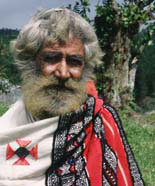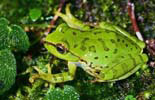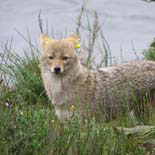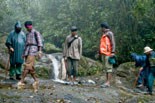 |
 |
 |
|
||||||||||||||||||||||||
India
The EBR/DSF Biodiversity Initiative
Within the biological hotspot known as the "Western Ghats and Sri Lanka," exists one particular region of enormous biological endemism, much of it as yet unanalyzed in full, spanning parts of Western Tamil Nadu and Eastern Kerala. While nearly 15% of the overall hotspot enjoys some form of designated protected area (*1), there remains much to understand, and more to preserve in these globally unique montane rainforests and among the indigenous people who live there - particularly the Todas, one of the last largely vegetarian tribes anywhere in existence.
EBR or the Edhkwehlynawd Botanical Refuge (the "place from which a beautiful view is to be seen," in the Toda, pre-Dravidian, language of Ahl) is a small parcel of private Trust land within this hotspot that harbors an educational and working scientific platform of great ecological and cultural importance. The EBR Trust was founded by Dr. Tarun Chhabra, an accomplished ecologist and a botanical specialist. Dr. Chhabra is one of the only people in the world, other than the Todas themselves, who speaks Ahl. With his associates, including the outstanding environmentalist Rami Singh, EBR has focused on helping the Toda to protect their traditional habitat, sustenance, agricultural gathering, and continue annual migrations with their sacred and endemic breed of buffalo. The fewer than 1,500 remaining Todas leave perhaps the lowest ecological footprint of any humans on earth (with the exception of Jain monks). Their knowledge of this hotspot goes back thousands of years, and their near universal vegetarianism and worship of buffalo and of nature, reveal a unique window on the human spirit and offer the hope of human sustainable communities in harmony with nature.
Toda water buffalo (Bubalus bubalis) are a vanishing breed, one of eighteen River buffalo breeds in South Asia.
According to recent data (*2) the Toda buffalo separated genetically from all others between 1800 and 2700 years ago. Without the Todas' love for this gentle creature and for the shola mixed forest-grassland ecosystems upon which they depend, this animal and Toda culture itself would go extinct.
The EBR/Dancing Star Foundation Biodiversity Initiative is committed to documenting the Toda's biologically remarkable habitat, and supporting local ecological restoration, study and replanting of native species and recording the tribal relationship with nature that harbors an ideal and blueprint for the future of human life on earth. A new joint EBR/DSF research expedition to fill in some biodiversity gaps within the greater Nilgiris Biosphere Preserve is being planned for the near future.
Footnotes:
1) Ajith Kumar, Rohan Pethiyagoda and Divya Mudappa, in Mittermeier, et.al, Hotspots Revisited, Cemex, 2004.
2) S. Kumar, et.al, "Genetic variation and relationships among eight Indian riverine buffalo breeds," Molecular Ecology, Vol. 15, March 2006, p.593.
See: http://www.ser.org/iprn/eitproject.asp
See: www.psyeta.org/sa/sa4.1/tobias.html
India, "NO VACANCY"
DSF's filming for "No Vacancy" across India, reveals a complex family planning challenge that varies from state to state. The key issues involve safe motherhood. In India, according to the late Mrs. Avabai Wadia, maternal mortality is one in 54, versus one in 9,800 in most Western nations. An enormous reproductive age population does not make for an easy fertility horizon in India. But the birthrate is declining, and more and more couples are opting to embrace family planning. In tribal India, that increase has gone from a mere 20% to over 60% of couples opting for family planning. Such progress suggests that the Indian sub-continent might yet get a handle on its human population explosion, which just might give some desperately needed respite for the countless species throughout India, like tigers, lions, elephants, and those others, all barely hanging on.
A key location in India for the Sanctuary book project is the Rajastani town of Pushkar, which boasts the only temple to India's creator, the mythic Brahma. Pushkar is a strictly vegetarian community. In fact, merchants, restaurants and hotels are strictly prohibited from selling or serving any non-vegetarian food. The entire town of 30,000 denizens, built between sacred mountains of the desert, adjoining a small lake, is home to wild families of monkeys, scores of bovines, goats and dogs, all commingling with the nearly 1.5 million tourists who come each year. This urban sanctuary is unique in the world given its successful vegetarian economics.
Family Planning Association of India
The Nilgiris, Southern India
India Enviromental Trust
http://en.wikipedia.org/wiki/Toda_people
http://www.nilgiris.com/





